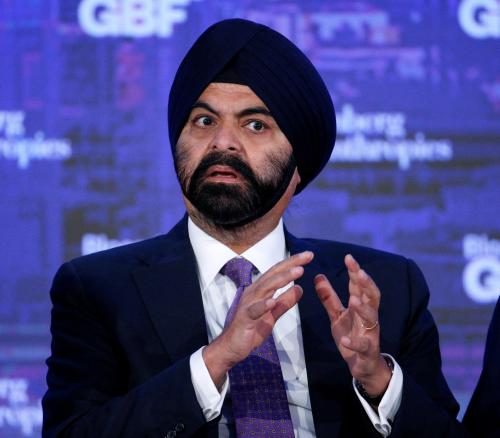The World Bank has a new president, but many questions remain about whether the selection process was indeed transparent, open and merit-based, as promised by the leaders of the Group of 20 economies.
Whatever the flaws in the process, the outcome may prove to be good for the bank’s future.
The preordained selection of the U.S. nominee, Jim Yong Kim, perpetuates the advanced economies’ dominance of the top jobs at the major international financial institutions.
This tradition has become untenable and unjustifiable. The predetermined success of Dr. Kim’s nomination reflects how global governance continues to lag behind shifting economic realities. Emerging market economies are increasingly dominant in global trade, finance and output, but the advanced economies continue to maintain their positions of privilege at the helm of major international financial institutions.
The old guard, which comprises the major advanced economies that once dominated the global economic landscape, will not give up its privileges without a fight. Changes in the structure of global governance will require more forceful and coordinated actions by emerging markets.
Such coordination has proven easier in the context of fighting for larger voting shares at the international financial institutions; in this case there is a common purpose as all emerging markets have something to gain.
When it comes to competition for specific jobs, emerging market countries have so far allowed individual ambitions to prevail over their collective interests. These countries will need to become more unified in terms of their objectives and strategy, rather than just complain about the existing structure, in order to effect significant changes in global governance.
Yet despite all the legitimate complaints about the World Bank selection process, a closer look reveals a far more open process than in the past.
When the top job at the International Monetary Fund opened up last year, European leaders immediately laid claim to putting one of their own at the helm. This was roundly and suitably criticized.
The United States has taken a different approach by simply putting forward the candidate it deemed best for the World Bank’s top job and letting him be judged on his merits. There has been no statement by any U.S. administration official that Dr. Kim should get the job simply because he is American.
There were two other credible and well-qualified candidates who got to make a case for themselves: Ngozi Okonjo-Iweala, the Nigerian finance minister and former World Bank managing director, and José Antonio Ocampo, the former Colombian finance minister and U.N. official.
In a major departure from past practice, Dr. Kim was chosen by a majority vote of the 25-member World Bank board, rather than by an artificial “consensus.”
The fact that the vote was stacked in favor of the U.S. nominee, given the nearly automatic support from other major advanced economies, is a matter of realpolitik rather than unfairness. If the emerging markets want to change the structure of power at global institutions, they will have to start wielding their growing economic clout more strategically and with unity of purpose.
Meanwhile, the Obama administration should at least be congratulated for its courage and vision in reaching beyond the typical slate of candidates — current or former government officials, typically with backgrounds in economics or diplomacy. If in fact this nomination was a fait accompli, then the United States has in some respects made it easier for the rest of the world to accept.
Dr. Kim’s impressive credentials as an expert on health and development issues, as well as his leadership experience at a major U.S. university, put him in a good position to initiate a much-needed reorientation of the World Bank’s role in global development.
The institution continues to lend to fast-growing middle-income countries like China and India that do not really need the relatively modest sums of money it has to offer. Instead, the bank should focus on its expertise in creating and implementing delivery systems for health and other public services. In other words, its money and human resources would be better spent catalyzing and helping to scale up innovative solutions to basic development problems.
Dr. Kim is not an economist, and some critics have suggested that he lacks a deep understanding of macroeconomics and finance. This is hardly a disqualification in itself. The truth is that macroeconomists (myself included) have made only limited progress in understanding what drives growth. There remains a lot that we cannot explain, and our models are inadequate in accounting for most of the cross-country differences in growth. An open-minded approach to seeing what works and what doesn’t rather than being bound by any specific models or theories might actually be an advantage.
This is not to say that economists are superfluous. Analyzing data carefully and creating analytical frameworks to understand what the data are telling us are critical functions. But it is presumptuous to argue that a noneconomist cannot possibly understand basic economic concepts as well as an economist. After all, Christine Lagarde, a lawyer by training, seems to have done quite well as the finance minister of France and now as the head of the International Monetary Fund. In many developing economies, applying basic principles of economics effectively can generate far better outcomes than more sophisticated prescriptions.
More importantly, Dr. Kim seems to have the intellectual self-confidence to surround himself with competent people, including intellectual iconoclasts, who can ask tough questions and seek answers that are not bound by ideology but are largely pragmatic. For instance, while growth plays a huge part in the fight against poverty, Dr. Kim may be right that growth is not the panacea it is often made out to be. Indeed, even a country like China that has accomplished remarkable reductions in poverty thanks to sustained growth has come to realize that a growth-at-all-costs strategy has enormous costs, including social conflict and environmental degradation.
Dr. Kim’s willingness to openly question conventional wisdom about growth and its benefits implies that he will face significant resistance from the entrenched bureaucracy at the World Bank. His status as an outsider may prove to be his strength in reforming the institution and making it more responsive to its poorer member countries’ needs.
Given Dr. Kim’s credentials and his unconventional background, he may also be just the person to deliver some real change to the governance structure of the institution. This is where support of this U.S. administration, which has shown a positive attitude towards multilateralism, could be a considerable asset.
If Dr. Kim can create alliances with emerging markets, then he could — with U.S. support — shake up a power structure that leaves advanced economies, and Europe in particular, with disproportionate power in setting the institution’s agenda. And this is a change that’s essential for the World Bank to maintain legitimacy in the eyes of developing economies as an institution that cares more about their interests than in carrying out the agendas of advanced economies.
The World Bank also needs to use the leverage it has in poor countries more aggressively to improve domestic public institutions and take a stand against corruption. This is no easy task, but the institution must clearly be seen to be serving its true constituents, the poor and economically underprivileged in developing economies, rather than the elites who often siphon away many of the benefits of growth.
But ultimately the World Bank’s legitimacy will also be determined by how it manages its own governance rather than just prescribing reforms to its member countries. Dr. Kim needs to set in motion changes to the Bank’s governance structure that give developing countries a greater say in setting the institution’s agenda and make the process of choosing his successor quite different from the one he just experienced.
He also needs to articulate and implement a clear vision of how the World Bank can improve its role in outcomes that really matter to the poor around the world.
If Dr. Kim can accomplish these objectives, he could turn out to be the tonic that the institution needs to reinvigorate itself and do some real and lasting good.



Commentary
Op-edKim Appointment May Spur Changes at the World Bank
April 20, 2012